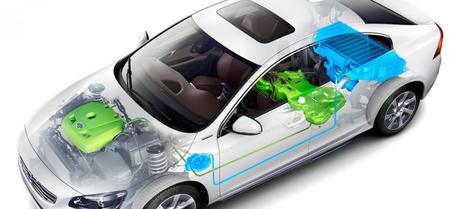 Plug-in hybrids with ‘memory’ can be 10% more fuel efficient. On the photo: Volvo S60L Petrol Plug-in Hybrid Electric Vehicle. (Credit: Volvo Group)
Plug-in hybrids with ‘memory’ can be 10% more fuel efficient. On the photo: Volvo S60L Petrol Plug-in Hybrid Electric Vehicle. (Credit: Volvo Group)For long distance driving plug-in hybrid electric vehicles use the internal combustion engine more than necessary. Chalmers researcher Viktor Larsson has developed a method to make the car remember the commuter routes and thereby make optimal use of the battery. The strategy can reduce fuel consumption by up to 10 percent compared to conventional methods.
Plug-in hybrids can reduce our dependence on fossil fuels significantly, but for longer trips both electricity and gasoline or diesel are still needed to travel the entire distance. The common solution today is that the internal combustion engine takes over when the battery is depleted of energy—a strategy that provides low energy efficiency in the long run.
SEE ALSO: Hybrid Cars More Fuel-Efficient in China, India Than in U.S.
By scheduling the use of the battery, fuel consumption can be decreased considerably for some trips. However, in such cases the car must have prior knowledge of the route to be traversed. PhD student Viktor Larsson from Chalmers University of Technology has developed a method that allows the car itself to identify recurrent routes and pre-compute when the battery should be used, and when running the car on petrol is more energy efficient. The method can be implemented in vehicles that are already in production, using existing technology. Viktor Larsson explains how it could work:
“After each trip, the vehicle can upload driving statistics to a server that identifies recurrent routes and calculates an optimal strategy for the energy management. The strategy is transferred to the car. For the next trip, the car can either try to identify the route completely by itself or ask the driver to verify if any of the most common routes will be driven”, says PhD student Viktor Larsson from the Department of Signals and Systems.
It is also possible that the system could be available in an app on the driver’s smartphone, instead of running on a server.
During the last year, Viktor Larsson has conducted the research in collaboration with Volvo Car Corporation, and has developed features that have been simulated and tested in an actual vehicle—the V60 Plug-in Hybrid.
“In the simulations we made, we saw that fuel consumption could be reduced by up to 10 percent compared to the strategy currently in use.”
Viktor Larsson presented his thesis, entitled Route Optimized Energy Management of Plug-in Hybrid Electric Vehicles, on Monday 12 May 2014.
The project Energy management of HEVs – fuel optimal control is part of the Swedish Hybrid Vehicle Centre (SHC) and has been performed at Chalmers University of Technology in collaboration with Volvo Car Corporation.

